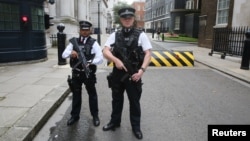Britain has raised its terrorism alert level in response to the rise of Islamic extremist groups in Iraq and Syria, and the belief that British citizens fighting with such groups could bring terror home.
The new British terror threat level is called “severe,” which means an attack is “highly likely,” but there is no information about a specific terrorist plan.
This is the first time in three years that the level has been so high, just one notch below the top of the scale ['critical']. Prime Minister David Cameron said the decision was made by an independent government commission because the rise of the group in Iraq and Syria once called ISIL or ISIS, which now calls itself the Islamic State, poses a threat to Britain.
“What we’re facing in Iraq now with ISIL is a greater and deeper threat to our security than we have known before," said Cameron.
Cameron said about 500 British citizens have gone to join the group in Syria and Iraq. Those men can easily re-enter Britain.
The masked terrorist who murdered American journalist James Foley earlier this month spoke with a British accent.
The prime minister is expected to ask Parliament next week to give the government more authority to go after such men, and to prevent them from leaving or re-entering the country.
Cameron characterized the fight against terrorism as a battle of ideologies. He said Britain will take a comprehensive approach to combat what he called the “poisonous narrative” of Islamic extremism.
“We cannot appease this ideology. We have to confront it at home and abroad. To do this, we need a tough, intelligent, patient and comprehensive approach to defeat the terrorist threat at its source," he said.
Cameron said that will include measures to promote moderation here in Britain, and stability and democracy in the Middle East.
He said Britain will also continue humanitarian aid drops in Iraq and intelligence sharing with allies. But he indicated the United States will remain in the lead on military action against Islamic State fighters.
Terrorism expert Raffaello Pantucci of the Royal United Services Institute says the Islamic State is mainly interested in increasing its power in and around the area it controls. But he says it has sometimes taken action farther afield, and the group’s leaders, or individual members, could decide to do so again.
“We’ve certainly seen a number of plots that have taken place in Europe, where it’s been clear that the individuals have fought alongside ISIS. It’s not clear that these individuals received tasking orders from the group to launch the attacks. It’s a large organization with a lot of people who are joining it. And some of them might decide that they should do something which they will see as an advance of the group’s aims, but isn’t necessarily directed by them," said Pantucci.
A terrorist who had fought for the Islamic State carried out the shooting at the Jewish Museum in Brussels in May that left four people dead.
Pantucci says most people will not notice the impact of Britain’s higher terrorism alert level, which he says will mainly affect the work of government agencies and security services.




